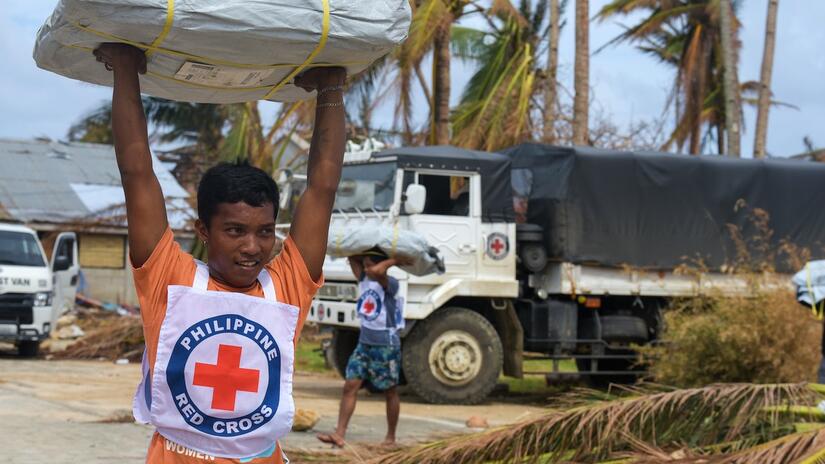Kuala Lumpur/Manila, 25 January 2022 – New assessments reveal the full extent of Super Typhoon Rai’s devastation when it slammed into the Philippines a little over a month ago, with the storm destroying or damaging a staggering 1.5 million houses, more than any other typhoon in recent decades.
Philippine Red Cross is ramping up its shelter support by transporting table saws, chainsaws and generators to areas hardest hit by the typhoon, including Cebu, Bohol, Palawan, Siargao and Dinagat islands.
The equipment is enabling Red Cross carpenters and trained volunteers to transform millions of fallen coconut trees into coco lumber to rebuild safer and stronger homes in the worst-affected areas.
Carpenters are training local people in safer house construction, to provide vital wages for families who lost their livelihoods, including the agricultural and fishing equipment they relied upon to earn an income.
Philippine Red Cross Chairman Richard Gordon said:
“This is a much bigger disaster than the world realised a month ago. People who relied on farming, fishing and tourism can’t earn an income now. Millions of people don’t have a roof over their heads.
"Red Cross is supporting 30,000 families with roofing materials like corrugated iron sheets and tarpaulins to protect them from the sun and rain, but we need greater international support to meet the enormous need for safer and stronger homes for millions of people.
“The typhoon comes in the middle of a pandemic and a political campaign, which draw attention away from what truly is a catastrophe. This must not become forgotten tomorrow morning.”
IFRC Head of Philippine Country Office Alberto Bocanegra said:
“It’s a little over one month since Typhoon Rai slammed into the Philippines, yet millions of people still urgently need humanitarian support, including homes, clean water supplies and healthcare.
“Assessment data reveals that this Super Typhoon has caused enormous devastation, destroying or damaging more homes than any storm in recent decades.
“Filipinos are tough, and they are rebuilding, with support from Philippine Red Cross and other agencies, but more must be done to help people rebuild their shattered homes.”
Philippine Red Cross has been on the ground since the super typhoon hit and has already reached 36,000 people with emergency shelter support, including toolkits, construction materials and tarpaulins to help people set up temporary shelters and start rebuilding. Emergency teams are providing kitchen sets, sleeping kits, pillows, mattresses, bedsheets, blankets and clothing.
Longer-term support is required to enable families to rebuild their homes safely, particularly those in vulnerable circumstances, living on isolated islands and in remote or hard to reach areas.
IFRC co-leads the Shelter Cluster Philippines with the Government of the Philippines to assess the typhoon’s impact on households, coordinating and prioritising emergency shelter work with all partners.
The International Federation of the Red Cross and Red Crescent Societies (IFRC) is appealing for CHF 20 million to support more than 400,000 people over 24 months. A top priority includes assisting people to rebuild safer shelters, including emergency housing materials and essential items, replacement of destroyed houses, and legal support on housing, land and property issues.
For more information, contact: IFRC Asia Pacific Office: Antony Balmain, +60 12 230 845, [email protected]
IFRC Philippine Delegation: Karina Coates, +61 (0) 404 086 006, [email protected]





